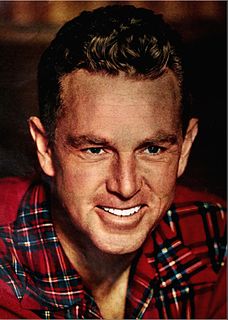A Quote by Friedrich Nietzsche
Man is very well defended against himself... The actual fortress is inaccessible, even invisible to him, unless his friends and enemies play the traitor and conduct him in by a secret path.
Related Quotes
"If a man finds it very hard to forgive injuries, let him look at a Crucifix, and think that Christ shed all His Blood for him, and not only forgave His enemies, but even prayed His Heavenly Father to forgive them also. Let him remember that when he says the Pater Noster, every day, instead of asking pardon for his sins, he is calling down vengeance on himself."
No man could bring himself to reveal his true character, and, above all, his true limitations as a citizen and a Christian, his true meannesses, his true imbecilities, to his friends, or even to his wife. Honest autobiography is therefore a contradiction in terms: the moment a man considers himself, even in petto, he tries to gild and fresco himself. Thus a man's wife, however realistic her view of him, always flatters him in the end, for the worst she sees in him is appreciably better, by the time she sees it, than what is actually there.
Some souls think that the Holy Spirit is very far away, far, far, up above. Actually he is, we might say, the divine Person who is most closely present to the creature. He accompanies him everywhere. He penetrates him with himself. He calls him, he protects him. He makes of him his living temple. He defends him. He helps him. He guards him from all his enemies. He is closer to him than his own soul. All the good a soul accomplishes, it carries out under his inspiration, in his light, by his grace and his help.
Why had we come to the moon? The thing presented itself to me as a perplexing problem. What is this spirit in man that urges him for ever to depart from happiness and security, to toil, to place himself in danger, to risk an even a reasonable certainty of death? It dawned upon me that there in the moon as a thing I ought always to have known, that man is not made to go about safe and comfortable and well fed and amused. ... against his interest, against his happiness, he is constantly being driven to do unreasonable things. Some force not himself impels him, and he must go.
I think it absolutely necessary that the President should have the power of removing his subordinates from office; it will make him, in a peculiar manner, responsible for their conduct, and subject him to impeachment himself, if he suffers them to perpetrate with impunity high crimes or misdemeanors against the United States, or neglects to superintend their conduct, so as to check their excesses.
Let a man choose what condition he will, and let him accumulate around him all the goods and gratifications seemingly calculated to make him happy in it; if that man is left at any time without occupation or amusement, and reflects on what he is, the meagre, languid felicity of his present lot will not bear him up. He will turn necessarily to gloomy anticipations of the future; and unless his occupation calls him out of himself, he is inevitably wretched.
I have this love for Mattie. It was formed in me as he himself was formed. It has his shape, you might say. He fits it. He fits into it as he fits into his clothes. He will always fit into it. When he gets out of the car and I meet him and hug him, there he is, him himself, something of my very own forever, and my love for him goes all around him just as it did when he was a baby and a little boy and a young man grown.
Whites have always put one against another and now they have a dead man who was nothin' but a, he admitted it himself, Malcolm X, was a tramp or had white women sellin' their body for him, he was nothin' until the Honorable Elijah Mohammed made him great, made him great, taught him, even his name X come from Elijah.
A king is a mortal god on earth, unto whom the living God hath lent his own name as a great honour; but withal told him, he should die like a man, lest he should be proud, and flatter himself that God hath with his name imparted unto him his nature also. JOHN LOCKE, "Of a King", The Conduct of the Understanding: Essays, Moral, Economical, and Political A king may be a tool, a thing of straw; but if he serves to frighten our enemies, and secure our property, it is well enough: a scarecrow is a thing of straw, but it protects the corn.
The opposition is indispensable. A good statesman, like any other sensible human being, always learns more from his opponents than from his fervent supporters. For his supporters will push him to disaster unless his opponents show him where the dangers are. So if he is wise he will often pray to be delivered from his friends, because they will ruin him. But though it hurts, he ought also to pray never to be left without opponents; for they keep him on the path of reason and good sense.
Only to two or three persons in all the world are the reminiscences of a man's early youth interesting: to the parent who nursed him; to the fond wife or child mayhap afterwards who loves him; to himself always and supremely--whatever may be his actual prosperity or ill fortune, his present age, illness, difficulties, renown, or disappointments--the dawn of his life still shines brightly for him, the early griefs and delights and attachments remain with him ever faithful and dear.









































